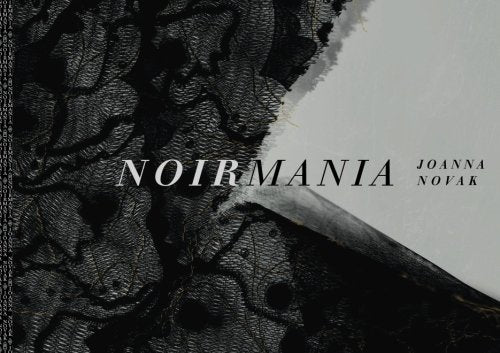Noirmania, by Joanna Novak
Noirmania, by Joanna Novak
Inside the Castle 9780999345900
Couldn't load pickup availability
-Peter Gizzi
“What is grim to one reader is a comfort to another: a relief, a long soluble sigh, an incantation. Depending on time of day, age, expectations, day of the week, moon cycle, state of mind. Or maybe I am actually dying or I understand we all are. Or maybe the word dead scares me or maybe it doesn’t scare me even a little and I like dark or the dark likes me—or every good thing that has ever happened to me happened there, that yin, that deep. JoAnna Novak’s powerful voice in Noirmania comes to the world starving, wailing, wise. Or it simply comes to the world from the world and we the readers walk away starving, wailing, wise. I love this book for its poetry broken like glass into gorgeous colors. I love it for its strangeness that echoes my own, for its spaces to fall into, for the way it catches me, holds me, then flings me somewhere else. I am grateful this book is in the world. I will read it often. On those days I am close to perishing, it will humanize me.”
-Maureen Seaton
“‘Sweet candy and a finger wet with blood’: JoAnna Novak’s entrancing, disturbing and beautiful ‘cortège’ is part hellish fashion shoot, part necroglamorous memoir, part grotesque diorama. Noirmania puts Novak in conversation with poets like Cynthia Cruz, Danielle Pafunda and Lara Glenum, contemporary writers who, like the late Plath, explores the politics of the female body with a no-holds-barred intensity.”
-Johannes Göransson
JoAnna Novak’s Noirmania, self-declared as a cortège, does not hold back its procession. She writes, ‘I’ve heard people describe hunger / as apartmental, Exodus with / two escalators white walls, stark over- / whelming windows.’ Like the Hollywood starlets who fed on Dexedrine and vodka in Malibu penthouses, Novak inhabits her starvation with precision and disavowal. ‘How quickly / nobody is lost,’ she says, herself an entity of the missing entourage. And isn’t it interesting, that a cortège can be both a funeral procession and an entourage? Novak is clear about her role, which, as with feeding, ‘was more missing than absent from / my plot.’ Like Mina Loy’s Lunar Baedeker series, Loy’s ‘chandelier souls of infusoria,’ Novak wanders us through her caves and harvests, only to show us that every shape is the emptiness of shape, a ‘circle, circle, circle’ in the ground’s infinite appetite for seed. ‘Planets were not grown but broken,’ she writes. Such declarations feel less like prophesy and more like promise. Noirmania surprises with its unlikely diction, a confessional dipped in silver and milk, a moony metropolis guided by an animal heart. Novak fathoms her space as a genius creature made of ‘nothing but metric.’
-Natalie Eilbert
Share

